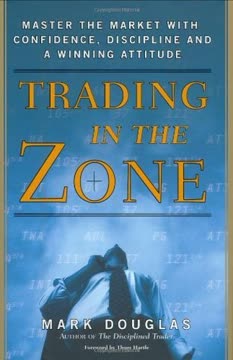मुख्य निष्कर्ष
1. ट्रेडिंग एक अनिश्चितता, जोखिम उठाने और अटकलों का व्यवसाय है
"ट्रेडिंग संभाव्यता और अनिश्चितता का खेल है। इसलिए, अपने स्टॉप लॉस पर टिके रहना सफल ट्रेडिंग का एक महत्वपूर्ण पहलू है।"
अनिश्चितता को अपनाएं। ट्रेडिंग अन्य व्यवसायों या करियर से मौलिक रूप से भिन्न है। यह अस्पष्टता के साथ सहजता और गणनात्मक जोखिम उठाने की इच्छा की मांग करता है। सफल ट्रेडर्स समझते हैं कि:
- हर ट्रेड का परिणाम अनिश्चित होता है
- नुकसान प्रक्रिया का एक अनिवार्य हिस्सा है
- दीर्घकालिक अस्तित्व के लिए जोखिम प्रबंधन महत्वपूर्ण है
- निर्णय लेने के लिए संभाव्यात्मक सोच आवश्यक है
इस वातावरण में सफल होने के लिए, ट्रेडर्स को एक ऐसा मानसिकता विकसित करनी चाहिए जो अनिश्चितता को स्वीकार करे, जबकि अपने विश्लेषण और रणनीति के आधार पर निर्णायक कार्रवाई भी करे।
2. भावनात्मक उतार-चढ़ाव से बचने के लिए लचीलापन आवश्यक है
"लचीलापन मानव मन के उन रहस्यों में से एक है, जिनसे मैं कई वर्षों से मोहित हूं।"
मानसिक मजबूती विकसित करें। setbacks से उबरने की क्षमता ट्रेडर्स के लिए आवश्यक है। लचीलापन आपको सक्षम बनाता है:
- नुकसान और गलतियों से जल्दी उबरना
- गिरावट के दौरान अपनी रणनीति में आत्मविश्वास बनाए रखना
- असफलताओं से सीखना, बजाय इसके कि उनसे हतोत्साहित हों
- दीर्घकालिक लक्ष्यों पर ध्यान केंद्रित रखना, भले ही तात्कालिक चुनौतियाँ हों
लचीलापन विकसित करने में शामिल हैं:
- आत्म-प्रतिबिंब और भावनात्मक नियंत्रण का अभ्यास करना
- अन्य ट्रेडर्स का समर्थन नेटवर्क बनाना
- जीत और हार दोनों पर दृष्टिकोण बनाए रखना
- अपने कौशल और ज्ञान में निरंतर सुधार करना
3. मनोवैज्ञानिक खतरें सबसे आशाजनक ट्रेडर्स को भी पटरी से उतार सकते हैं
"हारने वाले ट्रेड्स पर औसत निकालना नए ट्रेडर्स के बीच एक बहुत सामान्य प्रथा है।"
सामान्य pitfalls से सावधान रहें। कई मनोवैज्ञानिक जाल ट्रेडर्स का इंतजार कर रहे हैं, जिनमें शामिल हैं:
- औसत निकालना: हारने वाली स्थितियों में जोड़ना, उम्मीद में कि स्थिति पलटेगी
- प्रतिशोध ट्रेडिंग: जोखिम भरे ट्रेड्स के माध्यम से जल्दी से नुकसान की भरपाई करने की कोशिश करना
- अधिक ट्रेडिंग: बोरियत या FOMO के कारण बहुत अधिक ट्रेड करना
- भावनात्मक निर्णय लेना: डर या लालच के आधार पर अपने कार्यों को चलाना
इन खतरों को पहचानना उन्हें टालने का पहला कदम है। एक ट्रेडिंग योजना विकसित करें जो इन संभावित मुद्दों को संबोधित करे और इसे सख्ती से पालन करें।
4. अपने ट्रेडिंग करियर की सुरक्षा के लिए मनोवैज्ञानिक सुरक्षा उपाय विकसित करें
"दैनिक लाभ लक्ष्यों को निर्धारित करना / अपने दिन को समाप्त करना"
सुरक्षात्मक आदतें बनाएं। भावनात्मक संतुलन बनाए रखने और अपने पूंजी की रक्षा के लिए सुरक्षा उपाय लागू करें:
- दैनिक लाभ लक्ष्यों को निर्धारित करें और जब पहुंच जाएं तो ट्रेडिंग बंद करें
- अधिकतम दैनिक हानि सीमाओं को स्थापित करें और उनका पालन करें
- ध्यान केंद्रित रखने और दृष्टिकोण बनाए रखने के लिए नियमित ब्रेक लें
- वर्तमान में रहने और शांत रहने के लिए माइंडफुलनेस तकनीकों का अभ्यास करें
ये आदतें संरचना और अनुशासन बनाती हैं, जिससे आप आवेगपूर्ण निर्णय लेने से बचते हैं और अपने ट्रेडिंग करियर पर दीर्घकालिक दृष्टिकोण बनाए रखते हैं।
5. ट्रेडबुक बनाने और कुछ प्रमुख रणनीतियों में महारत हासिल करने पर ध्यान केंद्रित करें
"हमारी ट्रेडिंग में यह दर्शन है कि आपको केवल कुछ ठोस सेटअप में महारत हासिल करनी है (और उन्हें ट्रेडबुक करना है!) ताकि आप लगातार लाभकारी रह सकें।"
विशेषज्ञता और दस्तावेजीकरण। हर संभव ट्रेडिंग सेटअप में महारत हासिल करने के बजाय, इस पर ध्यान केंद्रित करें:
- उच्च संभाव्यता रणनीतियों की एक छोटी संख्या में विशेषज्ञता विकसित करना
- प्रत्येक रणनीति के लिए विस्तृत ट्रेडबुक बनाना, जिसमें शामिल हैं:
- स्टॉक चयन के लिए विशिष्ट मानदंड
- प्रवेश, निकासी और जोखिम प्रबंधन के लिए स्पष्ट नियम
- प्रदर्शन मेट्रिक्स और निरंतर सुधार नोट्स
विशेषज्ञता और अपने दृष्टिकोण का दस्तावेजीकरण करके, आप गहरी विशेषज्ञता विकसित करते हैं और सफलता के लिए एक प्रणालीबद्ध, दोहराने योग्य प्रक्रिया बनाते हैं।
6. एक ट्रेडर के रूप में खुद को जानें और यथार्थवादी लक्ष्य निर्धारित करें
"आपको यह पता लगाना होगा कि आप किस प्रकार के डे ट्रेडर के लिए सबसे उपयुक्त हैं।"
आत्म-जागरूकता महत्वपूर्ण है। अपनी समझें:
- जोखिम सहिष्णुता
- भावनात्मक प्रवृत्तियाँ
- संज्ञानात्मक ताकत और कमजोरियाँ
- पसंदीदा ट्रेडिंग शैली (जैसे, स्कैल्पिंग, स्विंग ट्रेडिंग)
यथार्थवादी लक्ष्य निर्धारित करें जो आपकी व्यक्तित्व और परिस्थितियों के साथ मेल खाते हों। केवल वित्तीय लक्ष्यों के बजाय प्रक्रिया-उन्मुख उद्देश्यों पर ध्यान केंद्रित करें। उदाहरण:
- ट्रेड निष्पादन की गति में 20% सुधार करें
- भावनात्मक निर्णय लेने की घटनाओं को 50% कम करें
- 90% ट्रेड्स के लिए 1:2 से ऊपर का जोखिम-इनाम अनुपात बनाए रखें
7. अपने ट्रेडिंग सफलता का समर्थन करने के लिए एक अनुशासित जीवनशैली विकसित करें
"आप अपने जीवन में जितने अनुशासित हैं, उतने ही अपने ट्रेडिंग में अनुशासित नहीं हो सकते।"
सफलता के लिए समग्र दृष्टिकोण। यह पहचानें कि एक ट्रेडर के रूप में आपका प्रदर्शन आपकी समग्र जीवनशैली से प्रभावित होता है। ध्यान केंद्रित करने के लिए प्रमुख क्षेत्र:
-
शारीरिक स्वास्थ्य:
- तनाव कम करने और संज्ञानात्मक कार्यक्षमता में सुधार के लिए नियमित व्यायाम
- ऊर्जा और ध्यान बनाए रखने के लिए संतुलित पोषण
- सर्वोत्तम मानसिक प्रदर्शन के लिए नियमित नींद का कार्यक्रम
-
मानसिक कल्याण:
- तनाव प्रबंधन तकनीकें (जैसे, ध्यान, जर्नलिंग)
- निरंतर सीखना और कौशल विकास
- बर्नआउट से बचने के लिए कार्य-जीवन संतुलन बनाए रखना
-
पेशेवर आदतें:
- बाजार विश्लेषण और ट्रेडिंग के लिए संरचित दैनिक दिनचर्या
- नियमित प्रदर्शन समीक्षा और लक्ष्य निर्धारण
- समर्थन और सीखने के लिए अन्य ट्रेडर्स के साथ नेटवर्किंग
जीवन के सभी क्षेत्रों में अनुशासन विकसित करके, आप ट्रेडिंग की चुनौतीपूर्ण दुनिया में निरंतर सफलता के लिए एक आधार तैयार करते हैं।
अंतिम अपडेट:
FAQ
What's Mastering Trading Psychology about?
- Focus on Psychology: Mastering Trading Psychology by Andrew Aziz emphasizes the psychological aspects of trading, highlighting how emotions, mindset, and self-discipline impact trading performance.
- Real-Life Experiences: The book includes firsthand accounts from various traders, sharing their struggles and successes, which helps readers relate to the challenges of trading.
- Three Pillars of Success: It outlines technology, strategy, and psychology as the three essential components for successful trading, with a strong focus on the psychological aspect.
Why should I read Mastering Trading Psychology?
- Enhance Trading Performance: The book provides insights into how mental skills can significantly improve trading outcomes, making it a valuable resource for both novice and experienced traders.
- Learn from Others: By sharing real-life stories, the book allows readers to learn from the mistakes and successes of others, which can help avoid common pitfalls.
- Comprehensive Approach: It covers various aspects of trading psychology, including risk management, emotional control, and the importance of a disciplined lifestyle.
What are the key takeaways of Mastering Trading Psychology?
- Resilience is Key: The book stresses that resilience is crucial for traders to recover from losses and maintain a positive mindset.
- Focus on Process, Not Money: Successful traders concentrate on executing their trading plans rather than fixating on monetary outcomes.
- Set Realistic Goals: Emphasizes the importance of setting achievable goals that prioritize skill development over immediate financial success.
What is the "Trilogy of Success" in Mastering Trading Psychology?
- Three Essential Components: The trilogy consists of technology, strategy, and psychology, which together form the foundation for successful trading.
- Interconnectedness: Removing any one of these pillars can lead to failure, emphasizing the need for a balanced approach.
- Psychology as a Pillar: While technology and strategy are important, psychology is often the most overlooked yet critical aspect of trading success.
How does Mastering Trading Psychology define resilience in trading?
- Capacity to Recover: Resilience is described as the ability to recover quickly from difficulties and setbacks, essential for traders facing losses.
- Mental Toughness: It is a measure of mental toughness, allowing traders to endure the emotional rollercoaster of trading.
- Learning from Hardship: Resilient traders learn from their mistakes and use those experiences to improve their trading strategies.
What are some common psychological hazards in trading according to Mastering Trading Psychology?
- Averaging Down: Identified as a significant psychological hazard that can lead to account blow-ups.
- Revenge Trading: Engaging in revenge trading after losses often results in further losses and emotional distress.
- Overtrading: Warns against overtrading, which can stem from emotional impulses rather than sound trading strategies.
What is the advice on setting goals in Mastering Trading Psychology?
- Define Realistic Goals: Encourages traders to set clear, achievable goals based on their trading strategies and risk tolerance.
- Daily and Weekly Targets: Suggests establishing daily and weekly profit targets, as well as maximum loss limits, to maintain discipline and focus.
- Focus on Process: Goals should be process-oriented rather than solely profit-driven, helping traders to stay grounded and avoid emotional trading.
How does Mastering Trading Psychology suggest handling losses?
- Accept Losses as Normal: Stresses that losses are an inevitable part of trading and should be accepted rather than feared.
- Reflect and Learn: After a loss, traders are encouraged to reflect on what went wrong and learn from the experience.
- Take Breaks: Advises taking breaks after significant losses to regain composure and prevent emotional decision-making.
What is the significance of emotional control in trading according to Mastering Trading Psychology?
- Control Over Emotions: Emotional control is highlighted as a critical skill for traders, as uncontrolled emotions can lead to poor decision-making.
- Mindfulness Techniques: Suggests using mindfulness and self-reflection to manage emotions and maintain focus during trading.
- Avoiding Impulsive Decisions: By developing emotional control, traders can avoid impulsive decisions driven by fear or greed.
What are some strategies for improving trading psychology mentioned in Mastering Trading Psychology?
- Journaling: Recommends maintaining a trading journal to track emotions, decisions, and outcomes, which can help identify patterns.
- Community Support: Engaging with a trading community for support and accountability is emphasized as a way to build resilience.
- Mindfulness Practices: Encourages incorporating mindfulness practices to enhance self-awareness and emotional regulation.
What are the best quotes from Mastering Trading Psychology and what do they mean?
- “Scared money never wins.”: Underscores the importance of confidence in trading, as fear can lead to poor decision-making.
- “You learn more from other people’s failures than their successes.”: Emphasizes the value of learning from mistakes, providing critical insights for better strategies.
- “Trading is not an endurance sport.”: Reminds traders that they don’t need to be in the market constantly, focusing on waiting for the right opportunities.
How can I create a successful trading routine based on Mastering Trading Psychology?
- Establish a Morning Routine: Suggests starting the day with a consistent routine that includes exercise and preparation.
- Develop a Watchlist: Traders should create a watchlist of stocks to monitor closely for better analysis and decision-making.
- End-of-Day Reflection: Incorporating a daily recap of trades helps reinforce learning and self-reflection.
समीक्षाएं
ट्रेडिंग मनोविज्ञान में महारत को मिश्रित समीक्षाएँ मिली हैं, जिसमें इसका समग्र रेटिंग 4.30/5 है। कई पाठक इसकी आत्म-अनुशासन, भावना प्रबंधन, और ट्रेडिंग रणनीतियों पर दी गई अंतर्दृष्टियों की प्रशंसा करते हैं। कुछ इसे नवोदित और अनुभवी व्यापारियों दोनों के लिए मूल्यवान मानते हैं, इसके आधुनिक संदर्भ और संबंधित अनुभवों की सराहना करते हैं। हालांकि, आलोचकों का तर्क है कि यह पुस्तक दोहराव से भरी हुई है, इसमें मौलिक सामग्री की कमी है, और यह उपयोगकर्ता टिप्पणियों पर बहुत अधिक निर्भर करती है। कुछ पाठक सुझाव देते हैं कि इसे और अधिक संक्षिप्त और केंद्रित बनाया जा सकता है। आलोचनाओं के बावजूद, कई लोग इसे ट्रेडिंग मनोविज्ञान को समझने और सामान्य गलतियों से बचने में सहायक पाते हैं।
Similar Books















